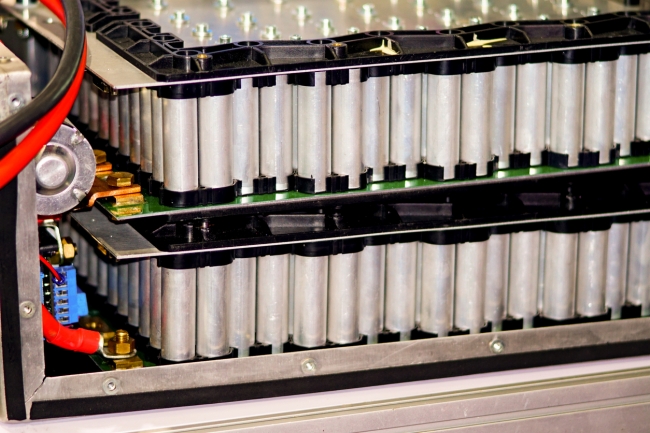5 minute read • published in partnership with Barclays
Opinion: Can the UK exploit the huge opportunities battery technology provides without repeating past mistakes?
From vehicles and consumer electronics, to healthcare devices and energy generation, every aspect of our lives has become increasingly dependent on batteries. As such, the commercial opportunities around innovative new energy storage technologies has become a strategic focus – not to mention a significant new revenue driver – for individual businesses, research institutions and entire nations. Lee Collinson from Barclays explores the huge opportunities available to the UK.
Indeed, the UK government has ambitious plans when it comes to battery technology – plans which it hopes will help avoid repeating an unfortunate previous oversight. You see the UK has form when it comes to battery technology.
Almost 40 years ago, Professor John Goodenough discovered lithium cobalt oxide while working in the Department of Chemistry at Oxford University. His discovery led to the development of the high-performance rechargeable lithium-ion batteries now so ubiquitous in modern society.
Yet, despite being internationally-heralded as one of the 20th century’s most ground-breaking discoveries, it wasn’t Professor Goodenough nor the UK who successfully commercialised the lucrative discovery, it was Sony and it paved the way for Japan to lead the world in the field for decades.

The commercial opportunities around innovative new energy storage technologies has become a strategic focus / Picture: Getty/iStcok
To minimise the risk of that occurring again and to maximise any potential returns, the UK needs to have four things in place:
• a research programme coordinated at a national scale,
• an innovation programme to support collaborative R&D,
• investment from government, academia and industry,
• and a scale-up programme to allow businesses of all sizes to rapidly move new technologies to market.
The ambition of the £246m Faraday Battery Challenge government research and innovation fund, launched in July 2017, precisely mirrors the above requirements.
The future of transportation
Of all the research areas and potential applications for battery technology, it’s not surprising the government has chosen to focus on automotive. The global electric vehicle battery market is forecast to see a compound annual growth rate of more than 20%, with zero emission, hybrid and fully electric vehicles estimated to be worth £5bn in the UK and £50bn across Europe within five years.
In its Road to Zero Strategy, the government pledged that at least half of all new vehicles sold in the UK should be low carbon by 2030, and it plans to phase out the sale of all new conventional petrol- and diesel-powered vehicles by 2040 to be replaced by electric and zero emission alternatives.
There are, however, several challenges that need to be addressed first – batteries need to cost less to manufacture than they do currently, they need to perform more efficiently and last longer, and at the end of their life they need to be more recyclable. These challenges are exactly what the Faraday Battery Challenge aims to overcome.
Though its initial focus will be meeting the government’s commitments around emissions and tapping in to the growing global demand for electric vehicles, the resulting innovations are hoped to advance battery technology for other applications within an electrified economy, such as aerospace, rail, healthcare and smart cities, as well as helping to create brand new industries and jobs.

The global electric vehicle battery market is forecast to see a compound annual growth rate of more than 20% / Picture: Getty/iStock
Playing to the strengths of UK industry
The road ahead may be daunting, but the UK has world-class expertise across a range of areas in battery science and has already built a significant number of research networks and pilot facilities from which the Faraday Battery Challenge will drive innovation.
With almost every major automotive manufacturer, from Aston Martin to Volvo, declaring that their future will be electric driven, the timing couldn’t be more opportune for the UK to reaffirm its position at the heart of this global revolution.
Already, numerous UK-based businesses and initiatives have made significant announcements and successes, including:
• A £50m Centre for Advanced Low-Carbon Propulsion Systems (C-ALPS) recently opened its doors, the result of a collaboration between Coventry University and global powertrain and vehicle engineering company FEV Group. The centre is available to Tier 1s and OEMs, SME suppliers and technology partners who are looking to accelerate the creation of new propulsion systems for use across the automotive, aerospace, rail and marine sectors.
• Uniti is a Swedish electric vehicle start-up aiming to meet the challenges of global mobility. The business recently announced plans to establish the pilot production facility not in Sweden but at Silverstone Park in Northamptonshire. According to its CEO, Lewis Horne, “From high-performance Formula 1 cars to alternative energy, British engineers have always had an excellent reputation for innovation.”
• Similarly, Singapore-based Vanda Electrics has announced that its 200mph D-1 electric supercar will be developed and built in Britain, following its debut at the 2018 Geneva Motor Show.
• Oxford University spin-out, Brill Power, has developed battery control and management technology that can make lithium-ion batteries last for up to 60% longer. The start-up has addressed poor longevity by producing modular batteries which means when one module goes, the whole battery doesn’t need to be replaced.
• Hyperbat is a joint venture between Williams Advanced Engineering and Unipart Manufacturing Group. Its Coventry facility aims to provide a secure future supply chain for UK-based car makers as their vehicles transition to electric power, and its first customer is Aston Martin for company’s Rapide E vehicle.
• Hyperdrive Innovation, a developer and manufacturer of lithium-ion battery technology, celebrated the 5,000th battery pack coming off its production line in Sunderland
• A leading electric motor manufacturer, YASA, has opened a new 100,000-unit capacity production facility in Oxford which is expected to support 150 high-skilled jobs. At the unveiling, its CEO Dr Chris Harris noted, “With the right support and investment, companies like YASA can become the powerhouse of the UK’s future economy.”
• The Catapult Programme has helped to deliver more than 4,000 industry collaborations, over 1,100 academic collaborations and support almost 6,000 small and medium-sized businesses – and while this is across multiple areas of R&D in the wider industry, much resource has been poured into battery & motor technology through this medium.
The road ahead
To answer the opening question – Can the UK exploit the huge opportunities battery technology provides without repeating past mistakes?
It already is thanks to collaborative initiatives like the Faraday Battery Challenge and the progress being driven by individual businesses. The UK is already a world-leader in battery technology, and there is an opportunity to scale our efforts further, but government funding alone isn’t enough to do it in the face of rising global competition.
We can all agree the pace of change is fast in all aspects of UK Manufacturing and battery technology is no different. We already see the OEM’s collaborating, and merging, as they pool their R&D resources. We all have a role in supporting this collaboration to ensure the UK remains the global centre for Battery technology.
